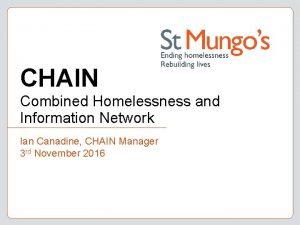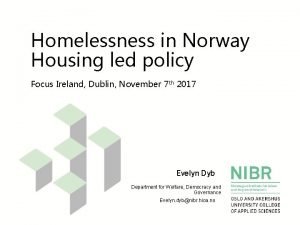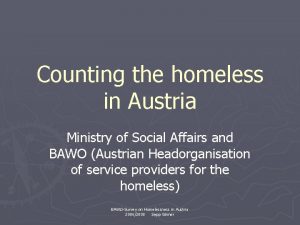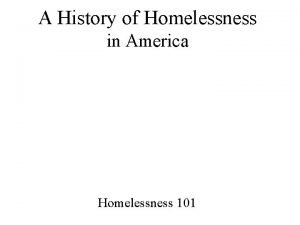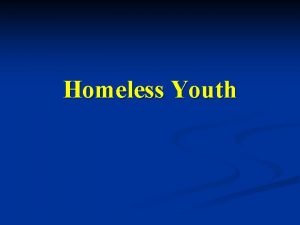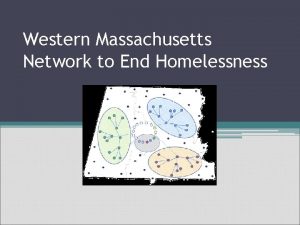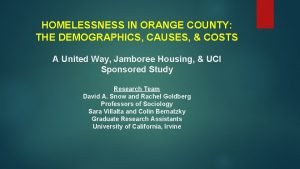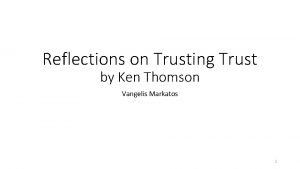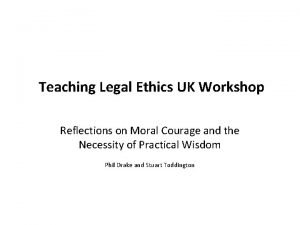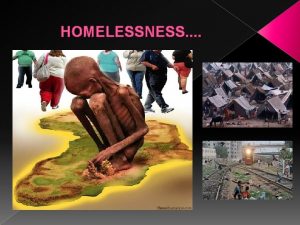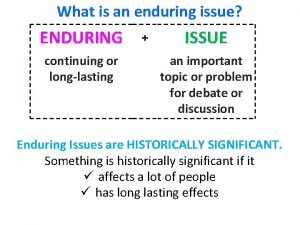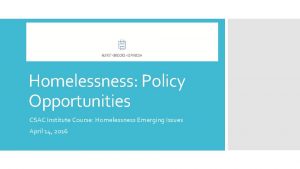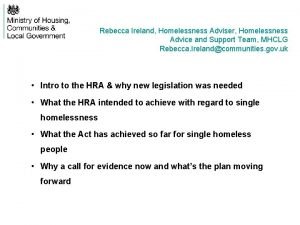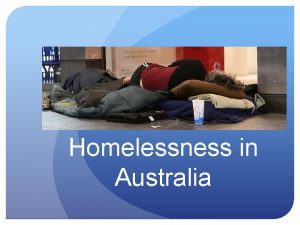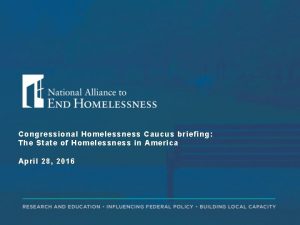Homelessness Policy Forum reflections on the enduring homelessness











![She [housing officer] was going like this: ‘right, so what’s your problem? ’ I She [housing officer] was going like this: ‘right, so what’s your problem? ’ I](https://slidetodoc.com/presentation_image_h2/fbf8db4f7ae1fcd9423a1fa1b65b973f/image-12.jpg)











- Slides: 23

Homelessness Policy Forum: reflections on the (enduring) homelessness crisis Kesia Reeve Centre for Regional Economic and Social Research, Sheffield Hallam University February 8 th 2017

The (current) homelessness crisis Number of rough sleepers in England 2010 -151 4 000 • rough sleeping has doubled in England since 2010 • 11% rise in households presenting as homeless since 2010/11 • 6% rise in statutory homelessness since last year 2 3 500 3 000 2 500 2 000 1 500 1 000 500 2010 1 DCLG 2011 2012 2013 2014 2015 rough sleeping statistics: https: //www. gov. uk/government/collections/homelessness-statistics statutory homelessness statistics: https: //www. gov. uk/government/collections/homelessness-statistics

100 years of homelessness crises 1946

1946 Homeless ex-servicemen and families occupy army huts in East London

Hostel struggles, 1965 -1967

1968 Guardian, December 2 nd 1968

1968 Ilford Pictorial Dec 4 th 1968

1970's

Cathy Come Home • ‘Cathy Come Home’ had been in 1966 and housing as an issue had really hit the public consciousness in a way that I think is unimaginable today…Shelter was formed on the back of the outcry of Cathy Come Home and housing was, I guess, the big social issue of the time. (Steve, housing activist in the 1970's) • …Also there was ‘Cathy Come Home’. That was one of the things that set [the squatters’ movement] off, that support for the homelessness problem. That’s when Shelter came about, coz there was no organisation dealing with it on a national scale, bringing it out. I think that ‘Cathy Come Home’ brought homelessness more to the consciousness of the people. (Eric; housing activist in the 1970's)


• 1 in 3 councils took children into care in 2014/15 because the family were homeless (Inside Housing, 18 th November 2016) CRESR survey of 144 homeless women in 2006: 1 • 30% of 'single' homeless female participants (n= 147) had children under the age of 16 • half of these were being looked after temporarily by others and 17% were temporarily in LA care • women are then treated as 'single' in legislative terms 1 http: //www. crisis. org. uk/data/files/publications/Crisis_Homeless_Women_2006_full_report. pdf
![She housing officer was going like this right so whats your problem I She [housing officer] was going like this: ‘right, so what’s your problem? ’ I](https://slidetodoc.com/presentation_image_h2/fbf8db4f7ae1fcd9423a1fa1b65b973f/image-12.jpg)
She [housing officer] was going like this: ‘right, so what’s your problem? ’ I says ‘well I’ve got nowhere to live’. ‘Right, have you got children? ’ ‘Yeah, that’s the problem see, I can’t get my children till I’ve got a house’. She’s gone ‘right, so where are the kids now? ’ ‘At their dad’s so they’ve got a stable life’. And then she goes ‘so they’re not living with you are they? ’ I says ‘well technically they are, technically yeah because I’m supposed to be with them, I’m supposed to have them, I raised them but I’ve got nowhere to stay so of course they’re with their dad because I’m not dragging them on the street. . But she just said ‘so they’ve got a roof over their head then, haven’t they? They’re not actually homeless’. But of course they’re homeless because they should be with me (Elaine, interviewed in 20091) 1 The Housing Needs and Experiences of Homeless Women Involved in Street Sex Work in Stoke-on-Trent.

Much has changed since Cathy Come Home. . . • Housing (Homeless Persons) Act 1977 = statutory duty to accommodate • Housing Act 1996, Homeless Persons Act 2002 = duty to provide 'advice and assistance' to all homeless people; and to have a prevention focused homelessness strategy • Homelessness etc. (Scotland) Act 2003 abolished priority need • Housing (Wales) Act 2014 - duty to prevent homelessness • array of initiatives and funding pots - rough sleepers initiative (1990's), B&B initiative, 'no second night out'; proliferation of third sector organisations; national charities established (Homeless Link, Shelter, Crisis)

. . so why do homeless people's experiences remain the same? • implementation / interpretation of the legislation and guidance - closely related to local housing market conditions • recent welfare policy undermining homelessness policy

Implementation of the legislation - rationing devices • intentionality • rigid assessment of vulnerability • gatekeeping • poor experience and misinformation deter further applications • particularly in areas of high demand - 'need' defined by housing market conditions/capacity to supply accommodation

Rationing devices (2) 437 single homeless people surveyed in 20111 • 28% had not sought help from a LA • 20% turned away without making a homelessness application • 46% of those awarded priority need were deemed 'intentionally' homeless • one third did not see and advisor 147 single homeless women surveyed in 20062 • Over 1/3 had not approached a LA as homeless • 28% of those awarded priority need deemed ‘intentionally homeless’ • in both samples very high levels, but rigid assessments of vulnerability 1 http: //www. crisis. org. uk/data/files/publications/Hidden. Truth. About. Homelessness_web. pdf 2 http: //www. crisis. org. uk/data/files/publications/Crisis_Homeless_Women_2006_full_report. pdf

I went to the housing and they says I wasn’t priority because I was working (Michael, interviewed in 2011). Me dad used to hit me and at age 15 the police moved me onto the Women’s House…I was back and forward to me nana’s, to me mum’s till 16 when I moved into an [supported housing project] property, I was evicted for ASB, I was then moved into [X] hostel. I was evicted from there for ASB as well…and I was on the streets for three weeks…I went to the housing place in Stoke and they put me in B&B, I was 17 then…. I had a homeless application form, they turned round and said I’m intentionally homeless cos I made myself homeless cos I knew the consequences so they couldn’t help me so then I ended up on the streets (Amanda, interviewed in 2009). . gave them all these documents and the telephone numbers for my herbalist, and doctors, and the police and for social services and occupational health. The housing officer went to see the manager and came back and said ‘you’re not priority’. But they hadn’t checked any of the information – they said they could tell just on face value, by looking at me. They said if I had to sleep rough I wouldn’t fair any worse than anyone else so I wasn’t vulnerable enough. By then I was so emotionally drained but I held in how I was feeling because before when I’d cried they’d called security. But I did ask for a decision letter because I knew I was entitled to that and I’ve still got it. I’d told them I’ve suffered from depression for 30 years and the letter said ‘everyone gets depressed. . . I knew by law they had to give me advice but I had to ask to see a housing advisor, they didn’t offer that. (Marcia, interviewed in 2007)

Welfare policy undermining homelessness policy? • Local Housing Allowance (LHA) caps in the PRS Ø reduce supply in high value areas as landlords 'get out' Ø reduce affordable supply Ø introduce a 'premium' for homeless tenants and claimants • benefit sanctions = arrears = eviction • range of welfare reforms affecting SRS (direct payment of HB, sanctions, introduction of LHA caps, RSRS) = a more cautious, commercially oriented sector? • proposed removal of Housing Benefit from under 21 s

Homelessness due to end of assured shorthold tenancy, England 2008 -2016 Source: DCLG statutory homelessness statistics

Housing benefit policy CRESR survey of 949 private landlords and 58 LAs in 20161 • over half of landlords reported that LHA caps had made them less willing to rent to benefit claimants • 68% of landlords were deterred from renting to benefit claimants because of direct payment, and 68% will only rent to benefit claimants if HB is paid to them not the tenants • landlords reported increasing deposits, contractual rents and making more extensive use of references and guarantors when renting to claimants. Only 13% did not. • 93% of LAs reported that LA rates were inadequate in their area • 90% of LAs reported a shortage of accommodation at the SAR 1 https: //community. crisis. org. uk/file/home-no-less-will-do/PRS_Report_FAedits. pdf

Sanctions Policy Survey of 1013 homeless people, 225 of whom had been sanctioned 1 • 46% of sanctioned respondents fell behind with housing costs Ø HB ceased to be paid Ø can't make up shortfall on LHA rate Ø can't pay service charge (e. g. in hostels) • 21% became homeless as a result of their sanction • 16% had to sleep rough as a result of their sanction • 56% said being sanctioned affected their ability to look for settled housing 1 http: //www. crisis. org. uk/data/files/publications/sanctions_report_FINAL. pdf

Final Reflections • Danielle got less than Cathy • despite legislative protection certain aspects of homeless people's experiences persist 50 years later • conflict between the direction of homelessness policy/legislation and of welfare policy • housing market conditions are a key influence on the help homeless people receive: housing need is assessed according to capacity to provide, not according to need

Thank you k. reeve@shu. ac. uk
 Definition of youth homelessness
Definition of youth homelessness Chain homelessness
Chain homelessness Housing options bristol
Housing options bristol Homelessness in norway
Homelessness in norway Finland homelessness solution
Finland homelessness solution The bill homelessness was
The bill homelessness was Michigan campaign to end homelessness
Michigan campaign to end homelessness Homeless in austria
Homeless in austria Homelessness
Homelessness Outcomes star system
Outcomes star system Abolish homelessness
Abolish homelessness Timeline of homelessness in america
Timeline of homelessness in america Definition of youth homelessness
Definition of youth homelessness Western mass network to end homelessness
Western mass network to end homelessness Orange county demographics
Orange county demographics Portfolio outline
Portfolio outline Reflection on a coordinate plane
Reflection on a coordinate plane 9-1 reflections
9-1 reflections Translate
Translate Reflections on trusting trust
Reflections on trusting trust Voice localization using nearby wall reflections
Voice localization using nearby wall reflections Mirror of guarding reflections
Mirror of guarding reflections Reflections
Reflections Horizontal and vertical reflections
Horizontal and vertical reflections

